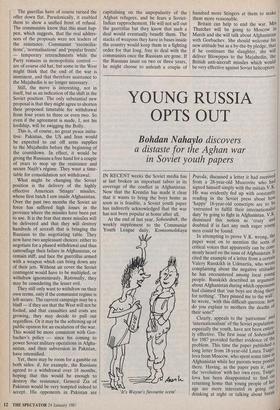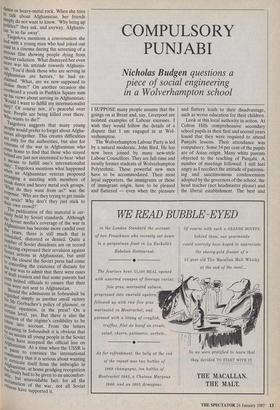YOUNG RUSSIA OPTS OUT
Bohdan Nahaylo discovers
a distaste for the Aghan war in Soviet youth papers
IN RECENT weeks the Soviet media has at last broken an important taboo in its coverage of the conflict in Afghanistan. Now that the Kremlin has made it clear that it wants to bring the boys home as soon as is feasible, a Soviet youth paper has indirectly acknowledged that the war has not been popular at home after all.
At the end of last year, Sobesednik, the weekly supplement to the Communist Youth League daily, Komsomolskaya 'It's Wayne's favourite scent'
Pravda, discussed a letter it had received from a 28-year-old Muscovite who had signed himself simply with the initials V.K. He was evidently fed up with constandY reading in the Soviet press about how `happy' 18-year-old conscripts are to be `entrusted to fulfill their internationalist duty' by going to fight in Afghanistan. V.K. dismissed this notion as 'crazy' and doubted if in fact any such eager young men could be found.
In attempting to prove V.K. wrong, the paper went on to mention the sorts of critical voices that apparently can be cony monly heard on the issue of Afghanistan. It cited the example of a letter from a certain Valery Russkikh in Udmurtia, who wrote complaining about the negative attitudes he has encountered among local young people. Russkikh described an argument about Afghanistan during which opponents had claimed that 'our boys are dying there for nothing'. `They pinned me to the wall , he wrote, `with this difficult question: boo' do you explain to mothers the deaths of their sons?' Clearly, appeals to the 'patriotism' and `internationalism' of the Soviet population, especially the youth, have not been entire: ly effective. The first issue of Sobesednik for 1987 provided further evidence of the problem. This time the paper published a long letter from 18-year-old Laura Tsaga. lova from Moscow, who spent some time In Afghanistan while her parents were posted there. Having, as the paper puts it, seen the 'revolution' with her own eyes, Tsaga" lova has been disappointed to find all returning home that young people of her age are more interested in going ou,,t drinking at night or talking about brea" dance or heavy-metal rock. When she tries to talk about Afghanistan, her friends simply do not want to know. 'Why bring up Politics?' they ask, and anyway, Afghanis- tan 'is so far away'. Tsagolova mentions a conversation she had with a young man who had joked out loud in a cinema during the screening of a serious film showing people dying from nuclear radiation. What dismayed her even more was his attitude towards Afghanis- 111.1. 'You'd think those who are serving in Tghanistan are heroes,' he had ex- !mimed. 'What, are we now supposed to idolise them?' On another occasion she overheard a youth in Pushkin Square sum uP his views about serving in Afghanistan: Would I want to fulfill my internationalist duty? Of course not, it's peaceful over here. People are being killed over there. Who wants to die?' Tsagolova suggests that many young People would prefer to forget about Afgha- nistan altogether. This creates difficulties il°t only for the authorities, but also for veterans of the war in Afghanistan who i')(3eltle home to find that those who stayed . hind are just not interested to hear 'what 1t means to fulfill one's internationalist mittr. Tsagolova mentions what happened Walien an Afghanistan veteran proposed break a meeting with members of dance and heavy metal rock groups. What do they want from us?' was the r. s'sPonse. 'Why are they trying to get inside .°111. souls? Why don't they just stick to their own crowd?' Jhe publication of this material is cer- „.4111Y bold by Soviet standards. Although the Soviet media's coverage of the war in ;lglianistan has become more candid over years, there is still much that is _`"neealed distorted or denied. Quite a I:Isintber of Soviet dissidents are on record So expressed their revulsion against s'u viet actions in Afghanistan, but until tow the closest the Soviet press had come distaste for the of „car was to admit xi that there werest cases eaft evasion_ and that some parents had 'en bribed officials to ensure that their sons were not sent to Afghanistan. ga e_v°hrded ould the admissions in Sobesednik be for simply as another small victory Mr Gorbachev's policy of glasnost, or heater openness, in the press? On a certain level, yes. But there is also the ta:ti°11 of the regime's credibility to be p -II into account. From the letters bbilearing in Sobesednik it is obvious that Unionmeans all young people in the Soviet Alpon have accepted the official line on at Afghanistan. At a time when the USSR is eo Pains to convince the international tollitiolnity that it is serious about wanting Afghan extricate itself from the imbroglio in hasstan, at home grudging recognition 41 filially had to be given to an uncomfort- 4,e, hot unavoidable fact: for all the ei*"..t,_iamation of the war, not all Soviet tzens have supported it.



















































 Previous page
Previous page